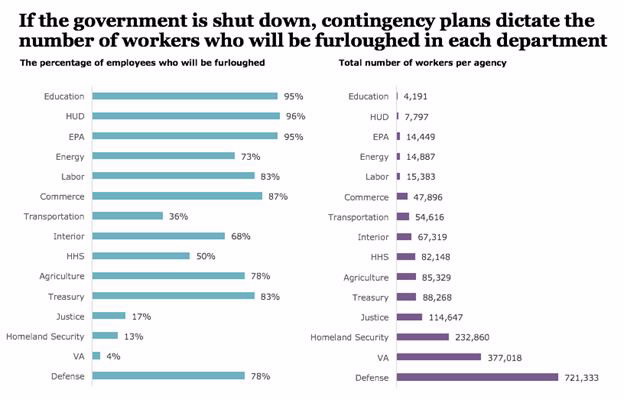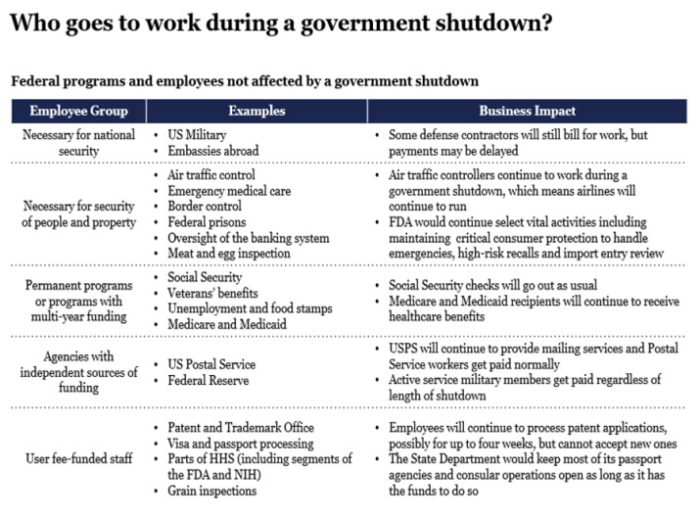“A partial shutdown starting Saturday would in some ways not resemble the one in 2013. They could have made the shutdown in 2013 much less impactful, but they chose to make it worse. The only conclusion I can draw is they did so for political purposes. So it will look different this time around.” – Mick Mulvaney, Director, OMB, 1/19/18
What would be the effects of a government shutdown?
Federal workers
Agencies are required to submit plans to the OMB outlining anticipated staffing levels during a shutdown.
Estimated furloughs range from 99.3 percent of those at the NLRB to 3.8 percent of those at GSA. Workers deemed “exempt” for protection of property and people are considered exempted from furlough.
Government contractors
Government contractors would not be paid during a shutdown.
Federal grant recipients
Administering federal grants could be affected by a shutdown.
Social Security and other government benefits
Recipients of Social Security, SSI, unemployment insurance, TANF, food stamps and some other programs would continue to receive benefits. The programs’ spending is not dependent on Congress’ explicit funding. However, some processes related to applying for or appealing a denial or reduction of these benefits might be stopped.
Medicare and Medicaid
In the last shutdown, some physician payments were slightly delayed, but the programs continued running.
Veterans hospitals
Congress has already explicitly funded VA hospitals, so they would not be affected by a shutdown.
Local parks, schools, libraries and government buildings
Since these entities are controlled locally and not by the federal government, they would not be affected by a shutdown.
Federal courts
The courts have at least three more weeks of funding after a government shutdown.
Congress
Congress would continue to work, though some low-level staff may not get paid.
Most federal office buildings
Most departments and agencies would be shut down, and their employees sent home.
NAFTA Negotiations
While the US Embassy and Montreal consulate remain open, it is unclear whether all the personnel from the various agencies that form the working groups would be cleared to travel and work.
National parks and monuments
OMB Director Mick Mulvaney declared at Friday’s White House news briefing that the parks would stay open during a shutdown.
Smithsonian museums and the National Zoo
The museums and the zoo have funding to stay open through Sunday but would close on Monday. However, we assume the animals would still be fed.
US Postal Service
The US Postal Service is an independent agency, so it would not be affected by a government shutdown.
Passport offices
Some passport offices would likely remain open. However, those located inside federal buildings would close.
Airports
Air traffic controllers, TSA officers and customs agents would continue to work at airports.
Special Counsel Mueller’s Russia investigation
The probe’s funding is approved by Congress outside of the normal government funding process, so it would not be affected by the shutdown.
Military operations
Active duty troops would continue to work, though some training exercises would cease.
IRS customer service
Automated processes would continue, but all processes that require people, such as customer service, would close.
Federal financial aid
Though 90 percent of Education Department staff would be sent home, people assigned to federal financial aid would continue working.
Food inspection
USDA inspection of meat, poultry and eggs would continue.


